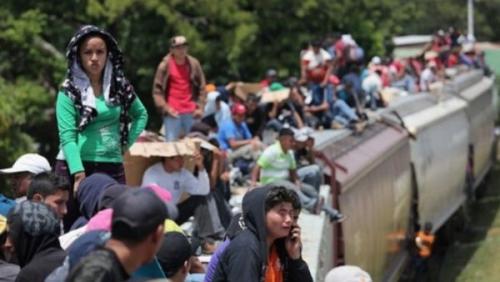International migration as an expression of inequality and global exclusion
Migration, contrary to xenophobic and racist nationalist discourses, generates a lot of money.
- Opinión

It can hardly be thought that the world of today is governed by a desire for justice and the values of respect and procuring a decent life for all people. What de facto is imposed is the idea of the production of wealth and its accumulation in a few hands, at all costs and regardless of human damages. There is the dramatic and undeniable eloquence of tens of millions of forced migrants and refugees who have been forgotten.
Contemporary migration in a structurally unequal world
With neoliberal globalization, which has spread throughout the planet, not only have the flows of goods and information increased, but also the processes of accumulation of money and capital have accelerated, and economic integration has been materialized in several regions. Globalization has boosted trade exchanges, but far from encouraging the free market to allow a broad process of redistribution that would bring greater benefits to the majority of the world's population, it has led to an alarming concentration of wealth and a substantial increase in inequality. According to one of the latest OXFAM reports, rewarding work and not wealth (2018), a small minority of around 1% of the world's population accounts for half of the planet's wealth and in recent years this trend has It has increased, growing inequality and the overwhelming and abysmal gap between levels of development and living conditions among a small group of hyper billionaires and hundreds of millions of people sunk in misery and barely survive. The current inequality is a massive and rapacious machinery for the generation of poverty and injustice.
Despite the selectivity of the borders, which allow the passage of goods and articles and a selective flow of people, international migration - undocumented and documented - has increased steadily in recent decades. The UN estimates that there are approximately 258 million migrants and that the growth trend of these processes of cross-border human mobility has been accelerating in recent years, increasing the number of migrants in 49% of 2000 to the present day. Migrants went from being 2.8% of the world population at the beginning of the 2000s to 3.4% at present. In addition, approximately just under 25% of the nearly 25 million human beings coerced into forced labor are migrants. Likewise, according to the report Making migration work for all (2018) of the UN, although men are the majority of migrants, women already represent 48% of this group. A clear reflection of the combination of exclusion, violence and forced migration are the almost 26 million people seeking refuge and asylum in the world today. Forced migration and refugees, moreover, have a high cost of human lives. According to data from the Missing Migrant Project, from 2014 to the present day more than twenty thousand refugees and migrants have died in various latitudes of the world trying to reach a safe and nonviolent destination.
Inequality and exclusion as a driver of migration
Migration, contrary to xenophobic and racist nationalist discourses, generates a lot of money. According to UN data, migrants leave more benefits than costs and generate an economic spillover greater than the expense derived from the use of state services. In addition, migrants send enormous sums of money to their families, a recent report from the UN reports that, in 2017, remittances sent reached almost 600,000 billion dollars - which meant three times the official aid to developing countries. What happens is that, derived from aggressive immigration-border policies and the lack of regulation in payments and working conditions, migrants in destination countries are exposed to precarious work situations, low wages, exploitation and absence of labor and human rights.
In this regard, it is necessary to understand that international migrations are the product and result of the lack of development opportunities and the adverse material conditions of life in many countries of the global South. Faced with national states and international organizations incapable of fostering human development environments, migrants are condemned to seek a future option outside their homes. In this way, a structurally unequal and unjust world, in terms of controlling the processes of production-distribution of wealth and the high accumulation of profits, generates the conditions for migration not only to continue, but to increase, as inequality increases and its consequent impact on the deterioration of the lives of millions of human beings. Thus, migration will continue to grow as: (1) the disparity / asymmetry of living standards between developed and developing countries is accentuated; (2) continue the natural disasters and their strong impacts on the countries of the global south; (3) armed conflicts remain and are accentuated in different regions of the world.
Del mismo autor
- Forced internal displacement in Mexico and processes of violence 13/03/2022
- Labor struggles against precarious work and agribusiness exploitation 09/01/2022
- Detentions, deportations, and criminalization of migrants 29/11/2021
- México: detenciones, deportaciones y criminalización de los migrantes 15/11/2021
- Visibility of migrant voices and subjects 18/10/2021
- La decolonialidad y el abordaje de las movilidades humanas transfronterizas 01/10/2021
- Migrants, social organizations, and policies to control cross-border mobility 20/09/2021
- Decoloniality and sense of the production of social knowledge 06/09/2021
- Decolonialidad y sentido de la producción de conocimiento social 26/08/2021
- México: migrantes, organizaciones sociales y políticas del control de las movilidades transfronterizas 09/08/2021
